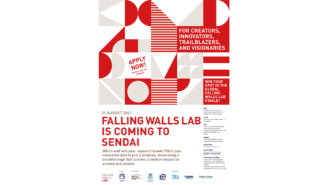-
 © DWIH Tokyo/iStock.com/Drazen_
Toru Kumagai’s report on R&D trends in Germany
© DWIH Tokyo/iStock.com/Drazen_
Toru Kumagai’s report on R&D trends in GermanyThe Future of Work: New Technologies and the Workplace
June 16, 2021 [by Toru Kumagai] The ongoing COVID-19 crisis that began in spring 2020 is significantly changing how people work in Germany and Japan. The pace of digitalisation, the shift to working remotely, the spread of artificial intelligence (AI), and the adoption of robots are all accelerating. In particular, in Germany the idea that telecommuting should be retained as one working arrangement even after the COVID-19 crisis is over is a powerful one. Moreover, with the further spread and propagation of the oncoming Fourth Industrial Revolution (the so-called “Industry 4.0”), expanding telecommuting beyond the companies in the financial services and information technology (IT) sectors into manufacturing industry is becoming an important issue.
-
 © IFMIF-DONES
Call & Job vacancies
© IFMIF-DONES
Call & Job vacanciesInternational Fusion Materials Irradiation Facility (IFMIF) / DONES (DEMO-Oriented Neutron Source)
[Deadline: 2021/06/30 at 23:59 GMT+2] The Research, Training and Mobility Programme – IFMIF-DONES is accepting applications for 13 positions (also in Germany and Japan) aimed at university graduates and doctoral degree holders to carry out a research, training and mobility programme at international research centres and laboratories related to the IFMIF-DONES project.
-
 © DWIH / istock (smirkdingo)
Call: Joint call 2021 (EIG Concert-Japan)
© DWIH / istock (smirkdingo)
Call: Joint call 2021 (EIG Concert-Japan)Sustainable Hydrogen Technology as Affordable and Clean Energy
[Deadline: 2021/07/09 17:00 (JST)] Are you involved in Sustainable Hydrogen research and interested in connecting with researchers in Germany and across Europe? The European Interest Group (EIG) Concert-Japan is now accepting proposals for “Sustainable Hydrogen Technology as Affordable and Clean Energy”.
-
 © DWIH Tokyo/iStock.com/hanabeni
Toru Kumagai’s report on R&D trends in Germany
© DWIH Tokyo/iStock.com/hanabeni
Toru Kumagai’s report on R&D trends in GermanyThe fight of the German government and medical community against the psychological effects of the Corona pandemic
June 08, 2021 [by Toru Kumagai] The Corona pandemic threatens not only people’s physical health, their economic wellbeing (as well as the national economy), but also their mental health. As in Japan, the negative impact of the pandemic on people’s minds has been taken up as a serious issue in German academic circles and discussion forums.
-
 © Tohoku University
Call: Falling Walls Lab
© Tohoku University
Call: Falling Walls LabFalling Walls Lab Sendai 2021
[Deadline: 2021/06/30] You are a Bachelor or Master student, a PhD candidate, postdoc, or young professional and want to share your innovative ideas with colleagues – and the world? Apply for the Falling Walls Lab Sendai 2021 on August 31, from 13:30-17:30 (JST) and win a trip to the finale in Berlin! And if you are worried about your presentation skills –this year the event features free coaching sessions!
-
 © DWIH Tokyo / Prof. Dr. Nils Madeja
Connecting East and West – A Short Interview with …
© DWIH Tokyo / Prof. Dr. Nils Madeja
Connecting East and West – A Short Interview with …Prof. Dr. Nils Madeja
Our new series “Connecting East and West – A Short Interview with …“ presents people involved in German-Japanese research collaborations – and their insights on how and where to cooperate successfully! This week we welcome Prof. Dr. Nils Madeja, Professor for Business Administration at the University of Applied Sciences Mittelhessen (THM) in Germany.
-
 © DWIH Tokyo/iStock.com/bagira22
Toru Kumagai’s report on R&D trends in Germany
© DWIH Tokyo/iStock.com/bagira22
Toru Kumagai’s report on R&D trends in GermanyWhy did the German government create an agency for disruptive innovations?
May 25, 2021 [by Toru Kumagai] The German government is actively working to encourage innovation by providing significant financial support for individual and corporate research and development projects based on landmark ideas that would overturn conventional wisdom. Here, we will introduce you to SPRIN-D, the agency that the government has created to achieve this goal.
- DWIH Tokyo
- Topics
- 2024: Artificial Intelligence: Spotlight on People and Society
- 2023: The Resilient Society
- 2022: Sustainable innovations
- 2021: Society in transition – impacts of the pandemic
- 2020: Cities and Climate
- 2019: Artificial Intelligence
- 2018: Working Innovatively in a Digital World
- Autonomous Driving
- Nanotechnology
- Network
- Research & Innovation
- Activities
- Annual Reports
